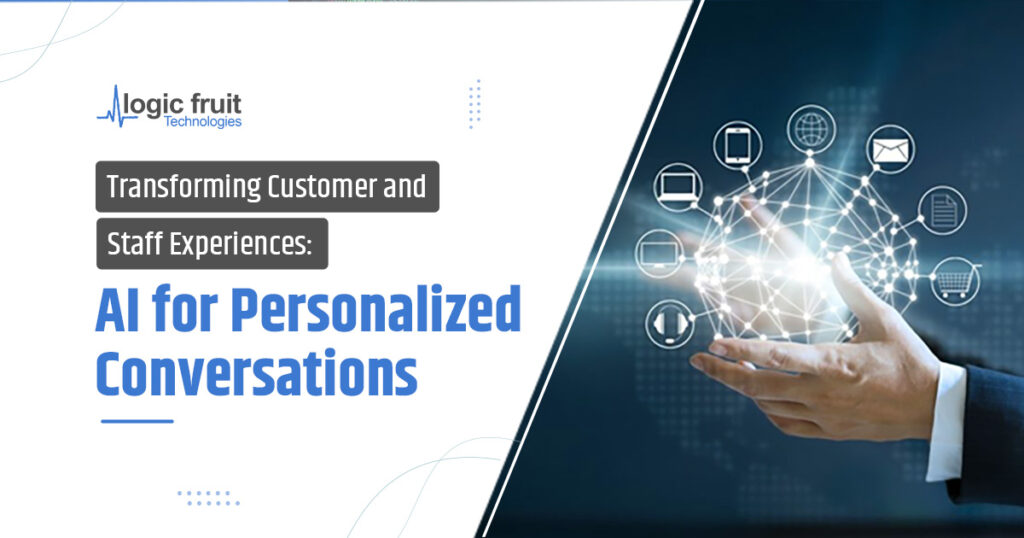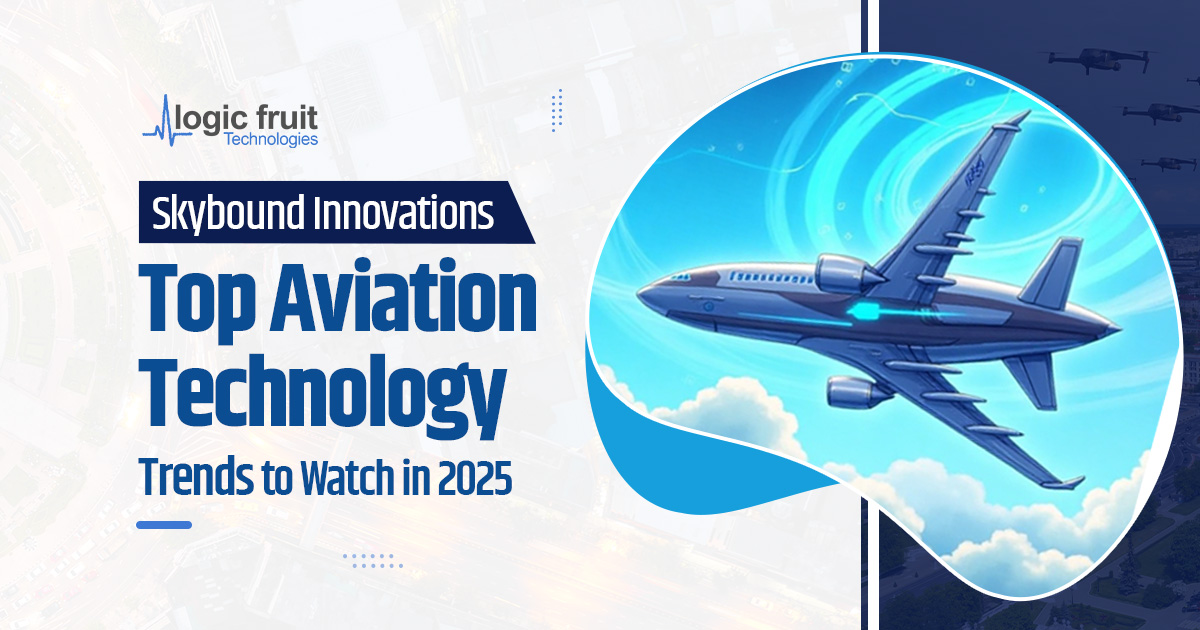Businesses constantly search for fresh and innovative approaches to increase customer happiness and engagement in today’s fast-paced business environment.
Artificial intelligence (AI) and chatbots have brought about a transformation in the internet marketing agency sector.
Chatbots and artificial intelligence (AI) are changing the support industry and enabling round-the-clock, personalized assistance.
One feature that most distinguishes our era is an abundance of alternatives for the client experience.
Customers have many options, so businesses need to compete to make themselves stand out in a competitive market.
Artificial intelligence personalization is a clear choice that can be used to deliver customized client experiences at scale.
Businesses that accomplish sustainable growth use personalization AI to precisely tailor experiences, unlock new levels of customer happiness and loyalty, and intimately understand their customers. This is done by combining creativity and data-driven decision-making.
According to Market Research, In 2023, the market for generative AI in customer service was estimated to be worth USD 371.1 million. It is anticipated to grow at a CAGR of 24.17% from 2023 to 2032, or USD 3062.5 million, by 2033.
Some of the major driving forces behind the emergence of generative AI in the customer service market are the rise in demand for cutting-edge technologies and their application in contact centers and other industrial verticals.
The cornerstone of any prosperous company enterprise is providing exceptional customer service. Every industry is seeing the rise of generative AI. Gen AI offers virtual support to foster better client connections, increase customer loyalty, and raise brand exposure.
What is AI-driven customer experience?
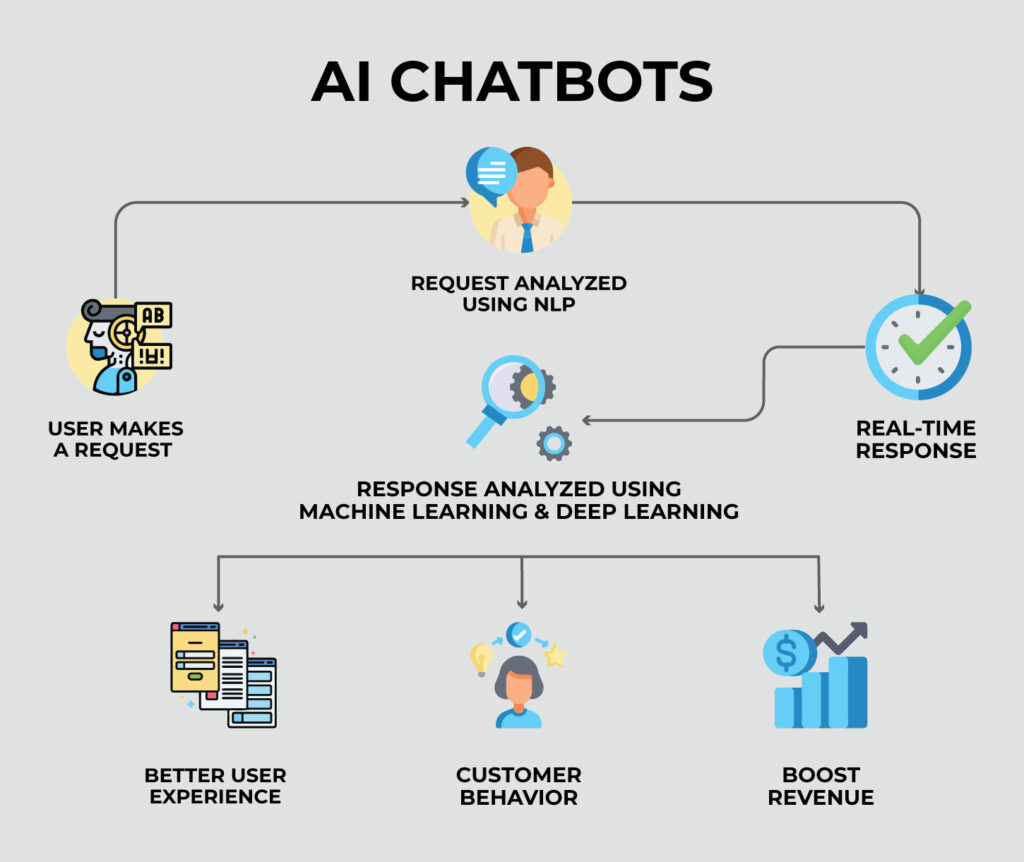
Simple chatbots, designed primarily to respond to commonly asked inquiries, were the precursors of conversational AI.
However, these chatbots evolved into what is currently known as conversational artificial intelligence when more sophisticated technology became accessible.
This expansion has been fueled by significant advancements in natural language processing (NLP) and machine learning (ML), improving systems’ comprehension and response to complex human language.
The development of technologies such as GPT-3 and GPT-4, which enable AI to remember past interactions and provide more personalized services, and the implementation of context-aware computing are important milestones on this route.
The ability of AI to recognize, comprehend, and interpret human emotions was a significant advancement that further brought AI and human contact closer together.
Numerous industries, including healthcare and banking, now employ conversational AI extensively for customer support.
Both customer happiness and operational effectiveness are significantly increased by its ability to handle multiple requests at once, reply to them promptly, and provide round-the-clock help.
With artificial intelligence, businesses can connect with customers more effectively and tailor every encounter, opening up a whole new universe.
Three key AI technologies text analysis, sentiment analysis, and natural language processing (NLP) are at the center of this revolution.
These tools give us significant insights into what clients truly want and need, in addition to taking the place of human labor.
Consider this: artificial intelligence (AI) is ensuring that every interaction—from sales calls to customer support chats to marketing emails—hits the mark in the background.
It’s not just about effectiveness, either. Artificial Intelligence frees up human workers to concentrate on higher-value, more difficult areas of their work by automating monotonous chores.
It is comparable to having a trusty assistant who handles the abundance of stuff, leaving you to tackle the big challenges with creativity and skill
What Is AI Personalization?
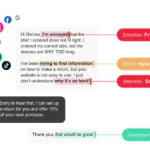
Customization with artificial intelligence is the process of providing highly targeted products, services, messaging, and more to specific receivers.
Instead of guiding their marketing and user experiences with broad consumer demographic data and generic acquired behavioral factors, brands may target specific users with their outreach and responses.
It is stated that although people may forget what you did or said, they will never forget how you made them feel.
By leveraging cutting-edge technologies, AI personalization produces and tailors outstanding customer experiences that are unique and tailored for each individual.
Personalized AI is capable of creating experiences that both anticipate and cater to the individual requirements and preferences of each customer by evaluating vast amounts of data on their behavior, preferences, and interactions.
You can make sure that every connection you have with your consumers feels unique and makes a lasting favorable impact by eschewing cookie-cutter, one-size-fits-all partnerships.
The rise of AI in the personalization of Customer Experience
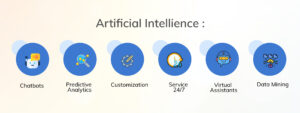
It’s becoming harder to downplay or overlook AI’s pivotal role in transforming customer experiences.
AI not only increases the effectiveness and scalability of customization, but it also creates exciting new opportunities for next-generation customer personalization.
Artificial Intelligence (AI) customization tailors every encounter, piece of information, and service to the distinct interests and behaviors of every client through the application of complex algorithms and data analytics.
According to SkyQuest, The size of the global artificial intelligence personalization market was estimated at USD 440.8 billion in 2022 and is expected to increase at a compound annual growth rate (CAGR) of 4.80% from USD 461.9 billion in 2023 to USD 672.11 billion by 2031.
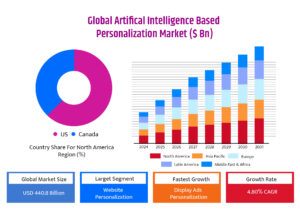
The market is being pushed by the increasing need in sectors like e-commerce, healthcare, and finance for consumers to have personalized experiences.
Businesses use AI algorithms to examine consumer behavior, interests, and interaction patterns to provide tailored marketing campaigns and flexible pricing options.
How AI improves Customer service
Embracing Personalization
In the future, customization will be crucial to customer service. Every customer wants experiences these days that are tailored to their preferences and needs.
Chatbots can remember previous transactions, purchases, and browsing habits. This enables them to offer guidance and assistance.
E-commerce businesses, for instance, can employ chatbots to suggest products to clients based on their previous purchases or browsing history.
Because of this, companies may have greater opportunity to increase income through upselling and cross-selling when they use chatbots and AI.
24/7 Availability
Artificial intelligence (AI) and chatbots which are always accessible and consistently provide rapid trustworthy service are revolutionizing customer satisfaction.
One benefit of chatbots is their ability to provide support. Customers can inquire at any time; they are not restricted to certain hours.
Companies that use chatbots may ensure that their customers can reach them at any time, regardless of the time difference.
The ease with which customers may obtain solutions to their issues and queries answered outside regular business hours is something that they like.
The company that creates chatbots offers 24/7 support to boost customer satisfaction and loyalty.
Effective Issue Resolution
AI and chatbots are capable of managing a variety of questions and jobs. This includes tracking orders, providing product details, and handling returns all without requiring human involvement.
This frees up human resources to focus on more important duties, like resolving problems and advancing leads.
Businesses may continuously provide high-quality services by automating critical jobs. It improves the clientele’s experience substantially. This strategy reduces operating costs while simultaneously streamlining operations.
Automation allows businesses to concentrate more on offering individualized, customer-focused services. This enhances communications with and relationships with customers.
To succeed in a cutthroat business climate, one must possess both efficiency and a human touch.
Enhanced Customer Engagement
Customer engagement changes the experience of the customer by offering personalized and timely communication.
This greatly improves the user experience and is crucial for building brand loyalty. These chatbots help in message sending and initiating conversations.
They are even capable of having conversations in normal language with one another, just like in real life.
A chatbot might wish its customers a happy birthday, for example. Therefore, in addition to satisfying consumers, these chatbots also promote customer loyalty.
Cost Efficient Solution
Chatbots and artificial intelligence (AI) offer cost-effective solutions that increase customer satisfaction with their personalized assistance. Marketing initiatives can also be improved with the use of chatbots.
Although chatbots don’t require pay, benefits, or vacation time, they can significantly reduce operating expenses. This lowers the cost of recruiting and training customer service representatives.
However, since chatbots can respond to queries, customer service representatives are no longer as essential. Scalability ensures that businesses can provide support without incurring costs.
Valuable Insights from Data
Chatbots offer immensely helpful data regarding user behavior, preferences, and customer inquiries. Based on the study of this data, businesses can make strategic decisions that will enhance their marketing efforts.
These perceptive ideas assist businesses in tailoring their strategy. This ensures marketing that is more customer-focused and suitable for the target demographic.
This encourages business expansion and improves customer involvement through prudent decision-making.
For instance, chatbot data informs businesses about the information that customers are seeing. This data can then be used for product enhancements and targeted marketing campaigns.
Consequently, it provides information on consumer preferences, which helps to accurately tailor marketing messages and offers.
The Role of AI in Customer Experience
AI is now able to assist businesses in comprehending, redefining, personalizing, and optimizing their experience. Here are some examples of how artificial intelligence is used in customer experience to help you see how powerful it can be.

Know Your Customer
The primary advantage of using AI to improve your customer experience strategy is that it gives you access to a multitude of current user data.
Natural language processing (NLP) and other artificial intelligence (AI)-driven technologies enable you to gather and analyze user data in real-time and keep abreast of changes in their expectations and behavior.
Simplicity, Efficiency, and Productivity
Another reason to rely on AI is that it enhances the productivity, efficiency, and simplicity of company processes through better customer experience facilitated by AI.
Repetitive tasks can be finished in half the time and effort required with the aid of technology, such as chatbots and self-driving software.
It also gathers and analyzes data in real-time to help you provide the concepts and features that users want to use and in the way that they want to interact with them.
Furthermore, the development of innovative mobile applications with a more straightforward structure and higher potential for efficiency is facilitated by the use of AI in quality assurance.
Better Decision Making
When it comes to making decisions, artificial intelligence is also working as a business’s best ally. Businesses may more easily forecast the future thanks to technology that examines past user interactions in addition to current market patterns.
In the end, it gives them clarity on what features or functionalities to add to their business solution to obtain a significant competitive advantage.
Streamline Purchase Process
In the current situation, several customers add items to their carts but never check out because of a difficult checkout process, delayed loading times, and other issues.
In this case, artificial intelligence helps businesses reduce the rate at which app carts are abandoned by understanding the difficulties that users confront and providing a flawless shopping experience.
Fraud Detection
Fraud detection is one of the main applications of artificial intelligence in the retail, healthcare, banking, and other industries when it comes to improving consumer experience.
The technology is making it simpler to spot any changes in the users’ behavior by utilizing its capacity to collect, store, and compare user data in real time. assisting in the prompt adoption of preventative measures against fraud.
Customer Analytics
Customer data analytics is another area where artificial intelligence is proving to be extremely important.
The process of compiling a large amount of user data from many sources and efficiently organizing it according to the important aspects is made simpler by AI customer experience platforms and solutions.
Self-Service
Many customers these days would prefer to manage things independently rather than relying on a service or equipment for help.
This is simply another example of why it’s becoming more and more important to use AI to enhance customer experiences.
Artificial intelligence provides useful data about where customers get stuck and what worries or inquiries lead them to get in touch with your support team.
Using these insights, you can provide consumers with options or answers to commonly asked queries, giving them the impression that their problems have been resolved.
Visual, Text, and Voice engagement
AI-powered platforms also offer the chance to provide the intended audience with the best possible customer experience by interpreting their speech or facial expressions.
To help businesses achieve long-term profits, technology that uses facial recognition and virtual assistants makes it simpler to grasp the feelings and sentiments of customers at any given time and find ways to deliver an instant positive effect through offers or reimbursements, etc.
Predictive Personalized Experience
Finally, AI facilitates the analysis of past user interactions and the forecasting of future actions for both new and well-established brands.
Thus, companies can use these data to present the ideal marketing offer to users. and increasing revenue and consumer engagement in the process.
Examples of AI personalization in the real world
Automation of customer service with AI is growing in popularity. These AI-driven chatbots can respond to consumer inquiries, handle straightforward problems, and deliver information immediately, day or night.
Personalization by AI can take many different shapes across the whole consumer journey. A few instances of AI personalization in action are as follows:
Empathetic, personalized messaging from contact centers
Due to their frequent overwork, customer support representatives may find it difficult to handle the broad range of channels needed in today’s market.
Furthermore, there’s an increasing need for intimate connections and increased empathy in different customer interactions.
There’s always the worry that fewer people will interact if AI is utilized to power chatbots and other communication tools.
On the other hand, AI personalization can help enhance the human-like aspect of client connections and enhance customer service representatives’ capacity to provide more knowledgeable, compassionate support.
Instead of giving pre-written responses, AI, for example, might give customized message that helps businesses develop a sympathetic relationship with their clients.
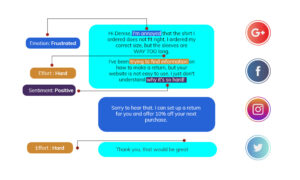
Chatbots with tailored AI that are powered by machine learning and trained on customer data gathered from thousands of encounters can identify sentiment, effort, emotion, and intent.
This makes it possible to precisely customize responses to reduce annoyance and raise client pleasure.
Hyper-specific upselling of products and services
Customization enabled by AI boosts the efficiency of product and service marketing. Not only AI-powered tools can suggest products bought by users that belong to the same demographic, but they can also suggest products bought by users that have similar choices in their baskets or that are relevant to each user that is being watched.
Putting them in real-time will boost the likelihood of a sale. Parallel to this, tailored ad targeting presents more pertinent product recommendations based on both general and specific customer information.

Dynamic websites
AI may create customized webpages based on the past steps clients have taken in the customer journey.
AI personalization can provide the precise website presentation that will match preferences and provide the best possible client experiences, from completely new landing pages to individualized product re-ranking.
Augmented in-person interactions
AI personalization may also revolutionize face-to-face encounters through the use of geo-location targeting, push messaging, and an abundance of customized customer data.
Customers can be enticed to make purchases by personalized direct marketing that is sent to their particular mobile devices with deals and discounts while they are close to physical stores.
Performance achievements
To prove the worth of your software, application, or service, give users reports that show what they have done or can do with the tool.
This method demonstrates the usefulness of the program and is necessary for any software platform that makes the promise to improve corporate performance, productivity, or any other performance- or achievement-oriented metrics.
This not only illustrates the advantages of the technology but also offers a convenient way to personalize the experience by showing the user’s areas for growth or accomplishments.
For instance, Grammarly uses all the information it gets from users to provide weekly reports that include a critique of their writing style.
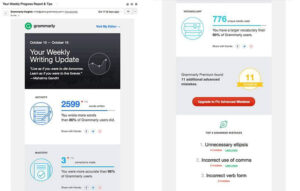
Targeted mobile push notifications to increase sales
For instance, Jio Mart uses a customer’s past orders placed on the app, website, or in-store to tailor the content of their push notifications on their mobile devices and offer deals.
The promoted offer has been selected based on the customer’s order history and frequently purchased items, as opposed to being a random campaign. The time of the notification is tailored to the customer’s likelihood of placing an order.
Sending out promotions-based messages at the ideal time on products that consumers often order increases order volume, click-through rates, and engagement dramatically.

Hyper-personalized content recommendations
For instance, Prime video is a market leader in the video streaming space not only because they have some of the greatest content available, but also because they are excellent at creating tailored experiences that successfully market their content.
A customer’s viewing and watch history, content ratings, items uploaded to “My List,” and other in-app activities are all taken into consideration when Netflix builds carefully crafted lists.
They do more for their users than just classify content into conventional categories like “Comedy” and “Action.” Examples of these bespoke lists include “Top Picks for You,” “We Think You’ll Love These,” and “Because You Watched X.”

The customer’s past browsing and viewing history, ratings, reviews, and general in-app activity are all taken into consideration when creating suggestions for specific material, as well as entire lists.
With each user getting a completely individualized experience and match percentages for content, recommendations are hyper-personalized.
AI Personalized Customer service mapping
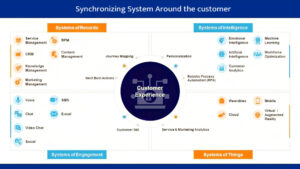
Conclusion
AI will play a major role in shaping the future of customer engagement, which will focus on more tailored experiences.
As this technology permeates commonplace corporate tools, client interactions become not just more meaningful but also more efficient.
AI is enhancing customer service; chatbots can now handle more complicated problems without constantly requiring human assistance.
They cut expenses, fix problems, give helpful data insights, and offer round-the-clock service. This is transforming how companies engage with their clientele and enhancing both customer satisfaction and operational efficiency.
In conclusion, artificial intelligence is a technology that is influencing our future today rather than being a technology of the future.
It plays a key role in improving consumer experiences by making them more efficient, emotionally connected, and individualized.
AI’s ability to evaluate enormous volumes of data, comprehend consumer behavior and preferences, and forecast future trends has made it a priceless tool for companies all over the world.
To ensure that AI improves rather than replaces human contact, businesses must prioritize ethical and transparent AI use as we embrace these revolutionary advances.


